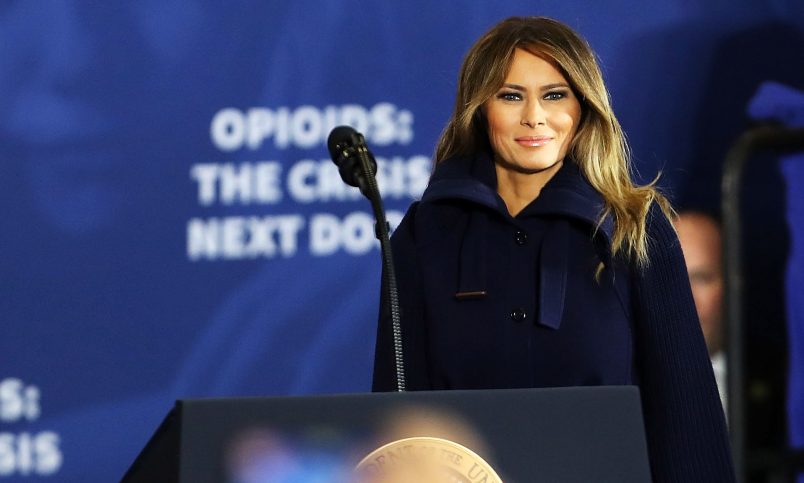WASHINGTON (AP) — Melania Trump is hosting executives from major online and social media companies to discuss cyberbullying and internet safety, more than a year after saying that would be her issue as first lady.
The meeting Tuesday marks her first public event on the topic, a choice some observers have questioned given that her husband often berates people on Twitter.
Amazon, Snap, Facebook, Google and Twitter are among the companies that are expected to attend the meeting. The Internet Association said it will also be represented.
All the major technology companies have strict policies prohibiting harassment and other bullying behavior on their services, but primarily rely on users to report abuses and weed them out. They try to clearly spell out the kinds of remarks and other posts that won’t be tolerated in special sections such as one Facebook, the largest online social network, has set up. Instagram, a popular service among kids and young adults for sharing photos and videos, provides links to the U.S. government’s anti-bullying site and tips from a cyberbullying research center on one of its help pages.
But the efforts so far have fallen short, leading to rampant abuses that even some of the companies acknowledge have driven away or tormented portions of their audience.
It got so bad on Twitter, which has 68 million U.S. users, that the San Francisco company vowed last fall to crack down on hateful tweets. Among other things, Twitter adopted new policies aimed at protecting women who unknowingly or unwillingly had nude pictures of themselves distributed online — a common bullying tactic.
Yik Yak, another messaging app once popular among high school and college students, shut down last year partly because schools banned it following complaints about bullying and harassment.
Online bullying takes many shapes, but some of the most common tactics include posting embarrassing or salacious photos, making demeaning or cruel remarks under a photo or in a general post about someone, and sharing screenshots of what at least one person thought was a private text.
Harassment is widespread and extends beyond teenagers. A Pew Research Center poll last year found 41 percent of U.S. adults believed they had been harassed online.
The popularity of and volume of content on major social media sites presents a huge challenge in policing what is being shared. Facebook, for instance, has 2.1 billion worldwide users who collectively share billions of posts on their pages daily. More than 300 hours of video is uploaded to Google’s YouTube site every minute.
The companies are also constantly struggling to balance the desire to prevent harassment and other abuses and maintain a commitment to freedom of expression.
In some cases, they see harassment and still look the other way. For instance, some of President Trump’s more vitriolic tweets have openly mocked and denigrated people, prompting calls for Twitter to shut down his account and ban him from its service. But Twitter has declined, maintaining the news value of the president’s tweets eclipse complaints about him being a bully.
There is no federal law that applies to bullying. State laws vary, ranging from requiring public schools to have a bullying policy to requiring anonymous reporting systems, said Sameer Hinduja, co-director of the Cyberbullying Research Center and professor of criminology at Florida Atlantic University. The federal government can best help by giving schools more tools and money to provide programs, Hinduja said.
Mrs. Trump announced in a speech near the end of the 2016 presidential campaign that her priority as first lady would be to fight cyberbullying. A native of Slovenia, she at the time lamented a U.S. culture that she said had grown “too mean and too rough.” It was a curious speech for a woman whose husband uses Twitter to dismiss people as losers and taunt them with unflattering nicknames.
The mother of a 12-year-old son, the first lady has made child well-being her focus in the White House, including an unexpected interest in how the opioid crisis is affecting youngsters.
She has visited hospitals and care centers to see the effects first hand, and has embraced parents whose children died from drug overdoses. She accompanied the president to New Hampshire on Monday as he discussed a three-pronged effort to combat drug addiction, including applying the death penalty against those caught trafficking highly addictive substances.
Mrs. Trump recently asked the spouses of U.S. governors to help promote values such as encouragement, kindness, compassion and respect in children. She has also spoken about limiting the amount of time children spend online, and helping them understand the content they are exposed to.







What a sad joke.
“What can possibly go wrong with that ?”
Even though irony is dead, it claws its way out of its grave, shakes its bony fist at all of us, then covers itself over again.
Wonder what twitter hashtag will be used for the mocking twitter pileon in response to this announcement.
Good for her. At this point she clearly hates the ahole she is married to, and this is a nice shot at him. It’s an important issue, and good for her for taking it on. Pence’s wife would be pushing for Bible classes.